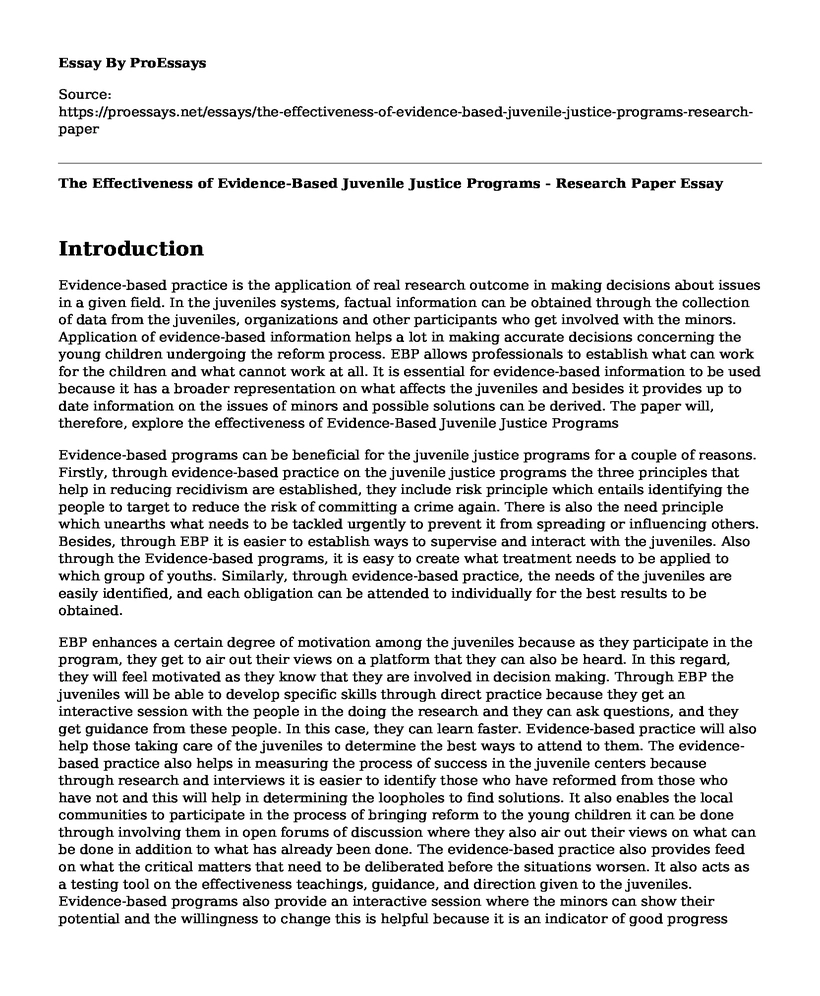Introduction
Evidence-based practice is the application of real research outcome in making decisions about issues in a given field. In the juveniles systems, factual information can be obtained through the collection of data from the juveniles, organizations and other participants who get involved with the minors. Application of evidence-based information helps a lot in making accurate decisions concerning the young children undergoing the reform process. EBP allows professionals to establish what can work for the children and what cannot work at all. It is essential for evidence-based information to be used because it has a broader representation on what affects the juveniles and besides it provides up to date information on the issues of minors and possible solutions can be derived. The paper will, therefore, explore the effectiveness of Evidence-Based Juvenile Justice Programs
Evidence-based programs can be beneficial for the juvenile justice programs for a couple of reasons. Firstly, through evidence-based practice on the juvenile justice programs the three principles that help in reducing recidivism are established, they include risk principle which entails identifying the people to target to reduce the risk of committing a crime again. There is also the need principle which unearths what needs to be tackled urgently to prevent it from spreading or influencing others. Besides, through EBP it is easier to establish ways to supervise and interact with the juveniles. Also through the Evidence-based programs, it is easy to create what treatment needs to be applied to which group of youths. Similarly, through evidence-based practice, the needs of the juveniles are easily identified, and each obligation can be attended to individually for the best results to be obtained.
EBP enhances a certain degree of motivation among the juveniles because as they participate in the program, they get to air out their views on a platform that they can also be heard. In this regard, they will feel motivated as they know that they are involved in decision making. Through EBP the juveniles will be able to develop specific skills through direct practice because they get an interactive session with the people in the doing the research and they can ask questions, and they get guidance from these people. In this case, they can learn faster. Evidence-based practice will also help those taking care of the juveniles to determine the best ways to attend to them. The evidence-based practice also helps in measuring the process of success in the juvenile centers because through research and interviews it is easier to identify those who have reformed from those who have not and this will help in determining the loopholes to find solutions. It also enables the local communities to participate in the process of bringing reform to the young children it can be done through involving them in open forums of discussion where they also air out their views on what can be done in addition to what has already been done. The evidence-based practice also provides feed on what the critical matters that need to be deliberated before the situations worsen. It also acts as a testing tool on the effectiveness teachings, guidance, and direction given to the juveniles. Evidence-based programs also provide an interactive session where the minors can show their potential and the willingness to change this is helpful because it is an indicator of good progress through open forums to express one's self. It is important to note that evidence-based programs can also have negative impacts on the juveniles because the information that is obtained can act as a hindrance to change because they feel pushed to give information concerning their lives.
Conclusion
In conclusion, it is essential to that evidence-based system in the juveniles play a critical role because it goes into details to obtain data that will be useful for decision making. Application of factual information helps a lot in making accurate decisions concerning the young children undergoing the reform process. EBP allows professionals to establish what can work for the children and what cannot work at all. It is essential for evidence-based information to be used because it has a broader representation on what affects the juveniles and besides it provides up to date information on the issues of minors and possible solutions can be derived. Evidence-based is one of the ways through which the juveniles systems can be improved, and problems sorted in the most modern manner. Through evidence-based practice the juveniles can easily air out their views on what best can be done to improve the quality of life. It is also a way of involving the minors in the process of finding a solution to what is affecting them. Future studies need to dwell much on how best the evidence-based practice can be used to improve the results among juveniles for the sake of faster and more comfortable reform.
Works Cited
Aos, Steven, and Elizabeth Drake. Prison, police, and programs: Evidence-based options that reduce crime and save money. Olympia, WA: Washington State Institute for Public Policy, 2013.
Siegel, Larry J., and Brandon C. Welsh. Juvenile delinquency: Theory, practice, and law. Cengage Learning, 2014.
Welsh, Brandon C., Michael Rocque, and Peter W. Greenwood. "Translating research into evidence-based practice in juvenile justice: brand-name programs, meta-analysis, and key issues." Journal of Experimental Criminology 10.2 (2014): 207-225.
Cite this page
The Effectiveness of Evidence-Based Juvenile Justice Programs - Research Paper. (2022, May 23). Retrieved from https://proessays.net/essays/the-effectiveness-of-evidence-based-juvenile-justice-programs-research-paper
If you are the original author of this essay and no longer wish to have it published on the ProEssays website, please click below to request its removal:
- Research Paper on Prison Abolition in Australia
- Human Trafficking in Southeast Asia Essay
- Laws Relating to Abortion, the Death Penalty, and Assisted Dying Paper Example
- The Legalization of Marijuana Annotated Bibliography
- Research Paper on Court Cases and Ethical Behavior
- Criminal Justice Public Policy
- Prison Population: A Cross-Section of Education Levels - Essay Sample







